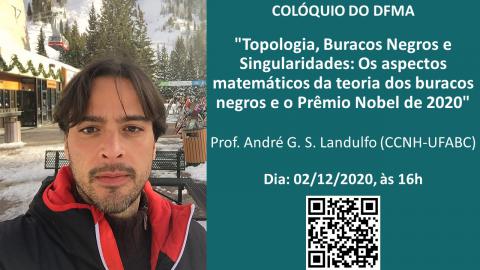O Lado Escuro da(s) Força(s)





Transmissão via Zoom e Youtube
Resumo: A universalidade do acoplamento aos diferentes léptons é uma propriedade do setor de calibre do Modelo Padrão, apenas não respeitada pelas interações de Yukawa, e que foi extremamente bem testada experimentalmente (LEP, decaimentos do tau etc.). Nos últimos anos, o experimento LHCb (CERN) tem observado crescentes indícios de violação da universalidade leptônica, em decaimentos raros de mésons B, que não podem ser explicados pelo Modelo Padrão. Dadas as pequenas incertezas teóricas envolvidas, caso esses resultados sejam confirmados com mais dados, eles corresponderão a uma evidência clara de física além do Modelo Padrão. Neste Colóquio, vou apresentar o status dessas medidas, assim que as suas possíveis implicações.

Transmissão via Zoom e YouTube
Resumo: We will review the scientific motivation and the early R&D that eventually led the IceCube project to transform a cubic kilometer of natural Antarctic ice into a neutrino detector. The instrument detects more than 100,000 neutrinos per year in the GeV to 10 PeV energy range. Among those, we have isolated a flux of high-energy neutrinos of cosmic origin, with an energy density similar to that of high-energy photons and cosmic rays in the extreme universe. We identified their first source: on September 22, 2017, several astronomical telescopes pinpointed a flaring galaxy, powered by an active supermassive black hole, as the source of a cosmic neutrino with an energy of 290 TeV. Archival IceCube data subsequently revealed a flare in 2014-15 of more than a dozen neutrinos from the same direction. Accumulating evidence suggests that the first cosmic ray accelerator belongs to a special class of active galactic nuclei that is responsible for the origin of the highest energy particles in the Universe.

Transmissão via Zoom e Youtube
Resumo: The recent observations of gravitational waves emitted by coalescences of binary compact objects like black holes and neutron stars marked the dawning of gravitational wave astronomy as a new science. Beyond the immediate and tremendous impact in Astrophysics and Cosmology, the consequences that the opening of this new observational window has on fundamental physics will be highlighted. In particular field theory methods, historically developed within the framework of quantum amplitude computations applied to particle physics, turned out to be useful to analytically model the dynamics of binary system, and they will be even more important to maximize the physics output of detections in the near future when more accurate observations of gravitational waves will be available.

Transmissão via Zoom e YouTube
Resumo: A relatividade geral é uma teoria sobre o próprio espaço-tempo, descrevendo de maneira dinâmica não só como a matéria é afetada pela estrutura do tecido espaço-temporal como também como este último acaba sendo influenciado e distorcido pela matéria presente. A gravitação, como conhecemos, acaba surgindo de maneira natural como um “efeito colateral” dessa dança entre espaço-tempo e matéria. No entanto, desde sua formulação por Albert Einstein em 1915 até meados da década de 1960, os avanços em desbravar tal teoria e entender seus aspectos fundamentais foi extremamente lento e difícil. Isso se deu por conta da dificuldade em se resolver as equações de Einstein usando o formalismo usual usado pelos físicos à época. Isso mudou completamente em 1965 com o trabalho seminal de Roger Penrose sobre singularidades e buracos negros. Penrose mostrou, de maneira geral e sem precisar resolver as equações de Einstein, que singularidades são inevitáveis no processo de colapso gravitacional quando a gravidade fica forte o suficiente. Para isso, ele trouxe métodos de topologia para analisar as propriedades do espaço-tempo, sua estrutura causal bem como o movimento da luz e da matéria. Com isso, ele não só mostrou que buracos negros (com suas singularidades) são previsões robustas da relatividade geral (o que lhe valeu o prêmio Nobel de 2020) como também pavimentou o caminho para o rápido desenvolvimento da área nos anos seguintes, nos quais os hoje chamados métodos globais introduzidos por ele desempenharam (e ainda desempenham) um papel fundamental. Nesse colóquio, serão discutidos de maneira acessível o que são esses métodos topológicos introduzidos por Penrose e quais suas consequências para o nosso entendimento dos buracos negros, das singularidades e da própria estrutura causal do espaço-tempo.

Confira em: https://youtu.be/fp0tufHVuyE

Transmissão via Zoom e YouTube
Resumo: Nesse Colóquio, o professor pretende apresentar os conceitos e ferramentas envolvidos na questão da Contextualidade, uma das principais características não-clássicas presentes na Teoria Quântica. Sua versão mais conhecida é a Não-Localidade, no sentido de Bell, que também será introduzida. Ao longo da última década, grafos e outros objetos matemáticos ganharam destaque nessas teorias. O professor apresentará um pouco da sua utilização, bem como apontará para alguns aspectos interessantes no mundo intermediário entre a Contextualidade pura e a Não-Localidade de Bell estrita.
